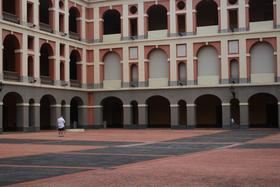Serving 499 students in grades 6-8, Peter Muhlenberg Middle School ranks in the bottom 50% of all schools in Virginia for overall test scores (math proficiency is bottom 50%, and reading proficiency is bottom 50%).
The percentage of students achieving proficiency in math is 60% (which is lower than the Virginia state average of 68%). The percentage of students achieving proficiency in reading/language arts is 57% (which is lower than the Virginia state average of 69%).
The student-teacher ratio of 12:1 is lower than the Virginia state level of 14:1.
Minority enrollment is 29% of the student body (majority Hispanic), which is lower than the Virginia state average of 56% (majority Black).
Quick Facts (2025-26)
- Grades: 6-8
- Enrollment: 499 students
- Student-Teacher Ratio: 12:1
- Minority Enrollment: 29%
- Overall Testing Rank: Bottom 50% in VA
- Math Proficiency: 60% (Btm 50%)
- Reading Proficiency: 57% (Btm 50%)
- Science Proficiency: 40-44% (Btm 50%)
- Source: National Center for Education Statistics (NCES), VA Dept. of Education
Top Rankings
Peter Muhlenberg Middle School ranks among the top 20% of public schools in Virginia for:
Category
Attribute
Student Attention
School Overview
Peter Muhlenberg Middle School's student population of 499 students has declined by 13% over five school years.
The teacher population of 42 teachers has declined by 8% over five school years.
Grades Offered
Grades 6-8
(Supplemental Virtual)
(Supplemental Virtual)
Total Students
499 students
Gender %
Total Classroom Teachers
42 teachers
School Calendar
School Motto
What You Do Now Matters
School Rankings
Peter Muhlenberg Middle School ranks within the bottom 50% of all 1,773 schools in Virginia (based off of combined math and reading proficiency testing data).
The diversity score of Peter Muhlenberg Middle School is 0.46, which is less than the diversity score at state average of 0.72. The school's diversity has stayed relatively flat over five school years.
Overall Testing Rank
#1337 out of 1773 schools
(Bottom 50%)
(Bottom 50%)
Math Test Scores (% Proficient)
60%
68%
Reading/Language Arts Test Scores (% Proficient)
(20-21)57%
69%
Science Test Scores (% Proficient)
(20-21)40-44%
59%
Student-Teacher Ratio
12:1
14:1
American Indian
1%
n/a
Asian
n/a
8%
Hispanic
20%
19%
Black
4%
22%
White
71%
44%
Hawaiian
n/a
n/a
Two or more races
4%
7%
All Ethnic Groups
Eligible for Free Lunch
79%
55%
Eligible for Reduced Lunch (21-22)
9%
5%
School Statewide Testing
School District Name
Source: National Center for Education Statistics (NCES), VA Dept. of Education
Profile last updated: 02/09/2025
Frequently Asked Questions
What is Peter Muhlenberg Middle School's ranking?
Peter Muhlenberg Middle School is ranked #1337 out of 1,773 schools, which ranks it among the bottom 50% of public schools in Virginia.
What schools are Peter Muhlenberg Middle School often compared to?
Peter Muhlenberg Middle Schoolis often viewed alongside schools like W.w. Robinson Elementary School, Signal Knob Middle School, Central High School by visitors of our site.
What percent of students have achieved state testing proficiency in math and reading?
60% of students have achieved math proficiency (compared to the 68% VA state average), while 57% of students have achieved reading proficiency (compared to the 69% VA state average).
How many students attend Peter Muhlenberg Middle School?
499 students attend Peter Muhlenberg Middle School.
What is the racial composition of the student body?
71% of Peter Muhlenberg Middle School students are White, 20% of students are Hispanic, 4% of students are Black, 4% of students are Two or more races, and 1% of students are American Indian.
What is the student-teacher ratio of Peter Muhlenberg Middle School?
Peter Muhlenberg Middle School has a student ration of 12:1, which is lower than the Virginia state average of 14:1.
What grades does Peter Muhlenberg Middle School offer ?
Peter Muhlenberg Middle School offers enrollment in grades 6-8 (Supplemental Virtual).
What school district is Peter Muhlenberg Middle School part of?
Peter Muhlenberg Middle School is part of Shenandoah County Public Schools.
School Reviews
1 10/10/2025
I am an eighth grade hers and I've been just about everywhere in the school and have suffered through three years of weird puberty stuff and the workload plus trying to figure out who I am plus battling depression has been really stressed full. The school also does nothing about the bullying from what I've seen and in half the classes I have I don't really absorb the information they're teaching me. Also, the dress code just doesn't make sense half the time. Some people get in trouble for showing belly while others don't and I've heard about people getting dress coded about ripped jeans. Overall, this school could be better with some improvements such as a more interactive learning plan giving out the right punishment to students and teaching the children here to be more accepting so as to stop the bullying.
5 10/10/2025
Fabulous! There's an anti-bullying student organization, teachers who are willing to help you, and all sorts of extra-curricular activities.
Review Peter Muhlenberg Middle School. Reviews should be a few sentences in length. Please include any comments on:
- Quality of academic programs, teachers, and facilities
- Availability of music, art, sports and other extracurricular activities
Recent Articles

How Public Schools Support Students on Free / Reduced-Lunch Programs
Explore how U.S. public schools support students eligible for free or reduced-price lunch through nutrition, academic, and wraparound services in 2025.

Hidden Costs of Public Schools: Fees, Supplies & Extras
Explore the hidden costs in public schools鈥攆ees, supplies, extracurriculars鈥攁nd how parents can plan for them in 2025.

Public School Funding 2025: What Families Should Know
Essential insights on public school funding in 2025鈥攈ow it works, what鈥檚 changing, and what families should know to stay ahead.





